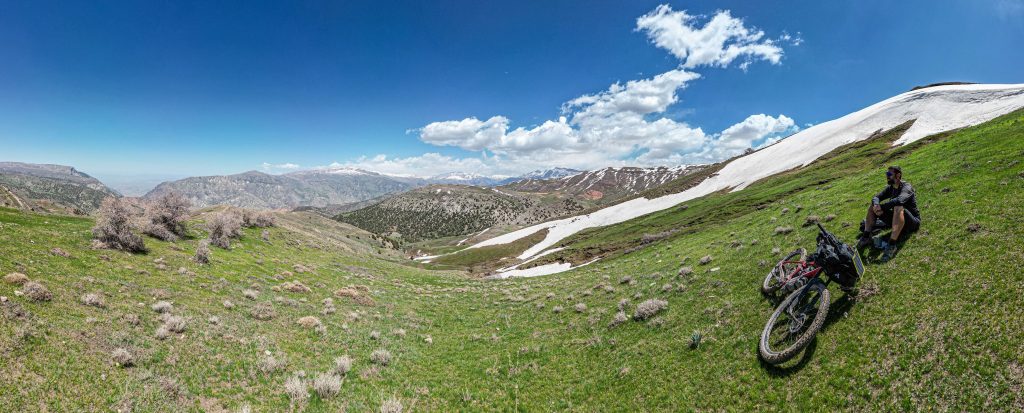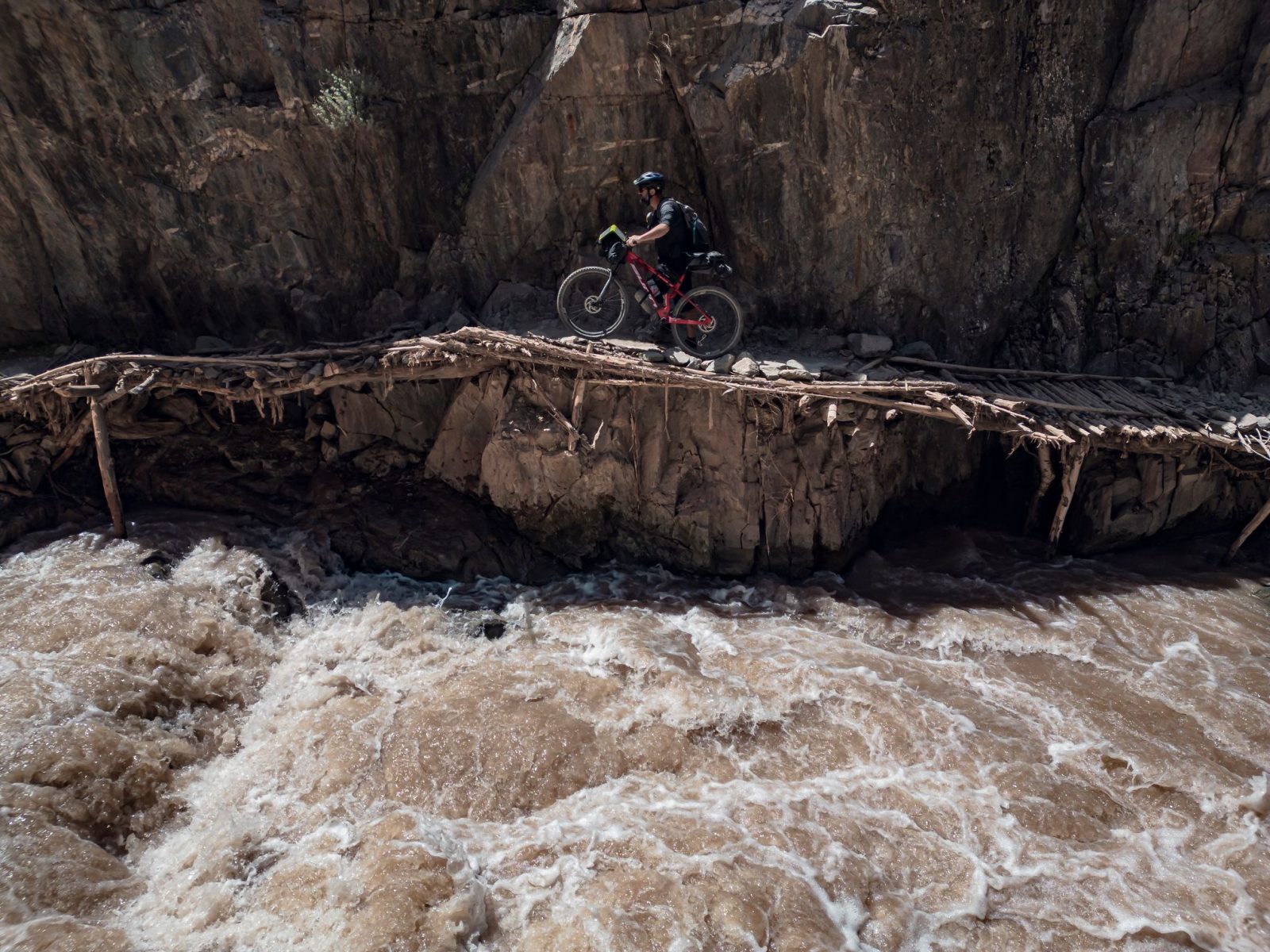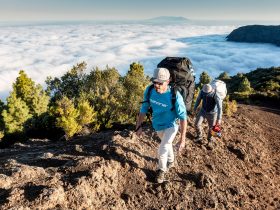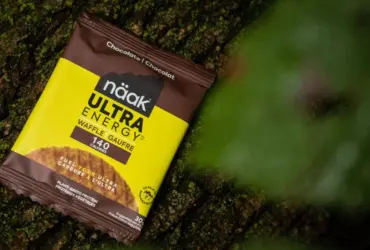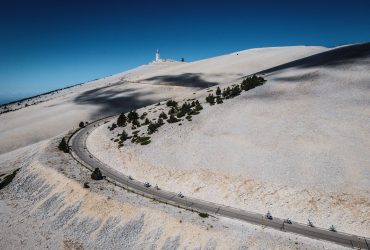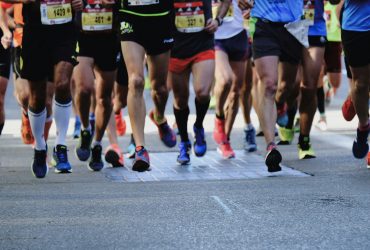Land of the Silk Road, jewel of Islamic architecture, Uzbekistan is a former republic of the former USSR. Now open to tourism, there are still some regions that have been completely overlooked on discovery tours. That's exactly where Cédric Tassan decided to set off on a solo exploration, from Samarkand through the mountains to the gateway to Afghanistan.
For the past 30 minutes, my wife Isabelle and I have been trying to weigh my bike once it's fully equipped. But the scale won't listen and the measurement isn't stable. And yet it's an important indicator of whether, once in its travel bag, the total authorized weight of the luggage will not be exceeded. A sign that should have raised my eyebrows...
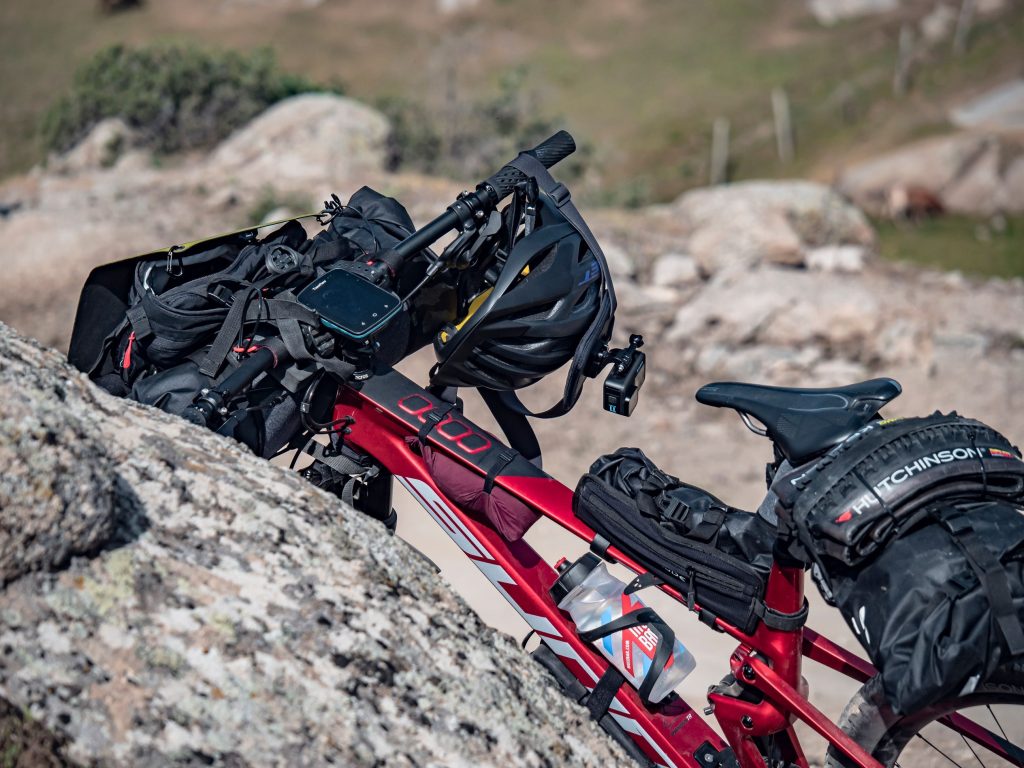
I board the plane and make my two flights to Tashkent, the Uzbek capital, without a hitch. Shavkat is waiting for me among the hundred or so people milling around the passengers exiting the airport. We've never met. We've only spoken on the phone. In the distance I see a guy raising his arm - that must be him! I make my way through the locals and follow Shavkat to his car. It's late and I'm dropped off at the hotel, so we can talk in the car tomorrow. After a short night's sleep, we head for Samarkand, one of the cities on the Silk Road, a 5-hour drive away. After hours of driving along a concrete canal lined with trees and fields, we finally start to climb. The landscape changes and we enter Samarkand, where I discover Registan Square. It's a real architectural slap in the face: built 600 years ago, this remarkable ensemble of Islamic art comprises 3 madrassas, Koranic schools and a mosque, recognizable by its dazzling blue dome. The earthenware is magnificent, fine and precise...
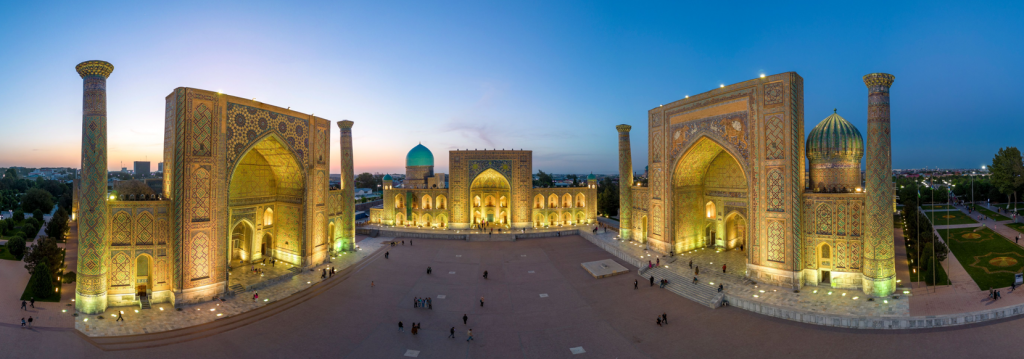
From my adventure in Uzbekistan, I plan to bring back a documentary. I want to try and understand why this country is one of the few in the world not to be affected by the rural exodus. Indeed, despite the siren call of consumerism in the big cities, the countryside and mountains have not been emptied. That's why I packed a lot of imaging equipment, which made my load considerably heavier: camera with lenses, tripod, GoPro and also a drone. For the latter, Shavkat pulled off a masterstroke: he got me a permit to use the device in this country, where it's totally forbidden to bring one in! So it was with undisguised satisfaction that I made my first flights over Registan in the company of the local police, who were dumbfounded that a foreign tourist could have been granted this exceptional favor!
The big start. I prepare my gear. I fix as many things as possible on my SUNN so as to carry as little as possible on my back. The next day I leave for Samarkand at 6.30am. Despite the tranquility of the city, I've barely left my hotel when I nearly hit a scooter! A warning in due form. From now on, I'll have to be vigilant every second. I leave the city for some backstreets and follow a long straight road where the traffic is getting heavier by the minute...
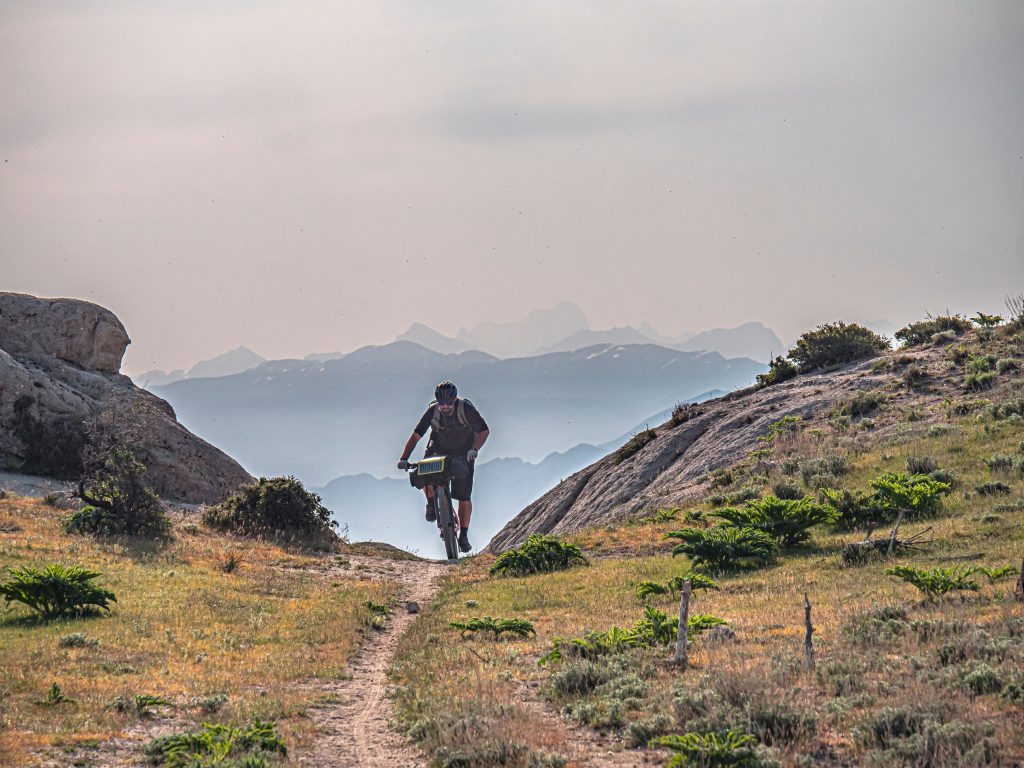
From the horizontality of the plain, I suddenly switch to the steepness of the mountain. Under a blazing sun - it's hotter than expected in this month of April - I climb the chaotic road, then the dusty track, under the stunned gaze of the locals. Gently dragging the 27 kg of my bike, it's like riding a big VTTAE without a motor... An inhuman effort. Soon the track stops and gives way to a path. I'm surprised it happened so soon. After all, I've still got over 1000 m of climbing to do. I take my time and realize that I don't have much in the way of food, just enough for a picnic lunch. I'll have to get to the village I'd planned for this evening. After 300 m up a magnificent river, I come across some shepherds. It's also my first encounter with ferocious dogs. One of them, a Tajik, offers to guide me further. From time to time, he wants to push my bike, his shirt swollen with perspiration. At a new hut, he shows me the next part of the route and decides to turn back. He leaves me his stick and explains that it will come in handy when I come across dogs. Sounds promising. I hang the club on my bike and set off alone into the mountains.
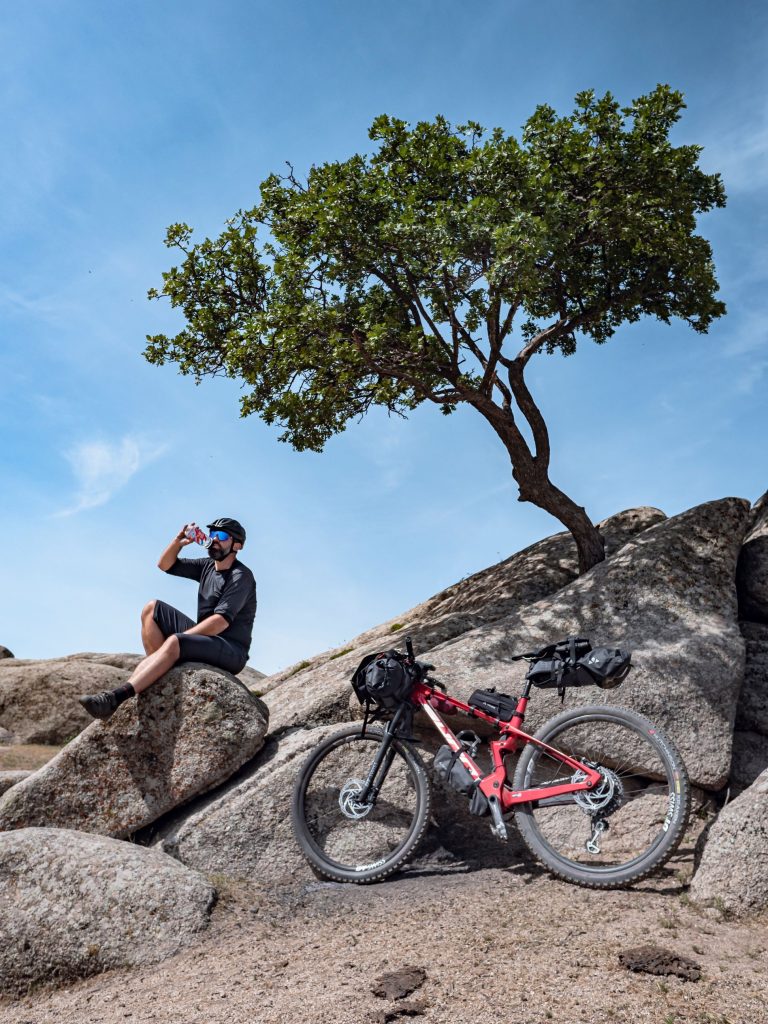
The trail is poorly marked, and I have to descend to the bottom of a river and then climb back up a horribly steep, partly collapsed slope. The heat is crushing me and I'm sweating profusely... The trail soon disappears. I realize that for the next 700 m I'll have to climb up the steep mountain slopes, picking my way through rocks and thorny bushes. It's an exhausting task with a load that's totally unsuited to the terrain. I reach the pass, at over 2000 m, after 1600 m of grueling ascent... It's 6.30pm. The sun sets in 30 minutes! I know I'll never reach the village, so I'll have to bivouac and make do with very little food and half a liter of water... It smells like a mission. I leave the windy ridge and find a sheltered spot further down. I start to gather some wood for a fire when 2 young boys on donkeys surrounded by menacing dogs appear out of nowhere. I've lost my stick a while ago, so I hope the shepherds know how to handle their monsters. They approach and, from what I understand, invite me to follow them to their camp. We convoy downhill, the dogs' fangs close to my calves, to a small ridge where a plastic tarpaulin in the shape of a tent stands. I hope they've got some food, because I'm starving. Despite their insistence that I sleep in the tent with them, I decide instead to sit with my head in the stars right next to it. They're afraid I'll get cold. But I'm pretty well equipped. The dogs are getting used to my presence. I'm part of the pack. The 2 shepherds, aged 14 and 15, offer me bread and tea. I drink almost the whole pot. The night passes without a hitch, one of the molosses having decided to lie down a few meters from me.
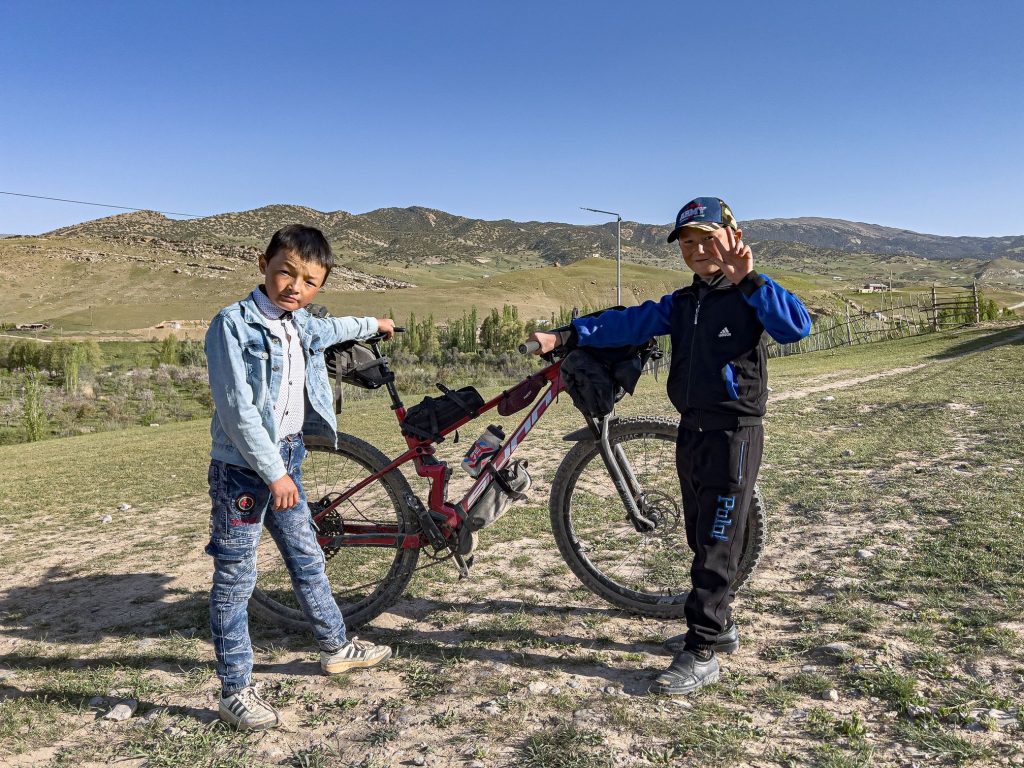
We wake up to tea and bread for breakfast. After taking a few pictures and leaving them a printed photo as a souvenir, I leave them to tackle a superb descent on a ridge amidst fantastic granite rocks! Great mountain biking! I'm delighted to have discovered this exceptional track, which takes me almost 1000 m downhill. When the sun comes out, it's already very hot. Once in the valley, I continue downhill along a track, regularly coming across locals who are in awe. I'm a sensation. At the first mini-market in a village, I treat myself to a tasty snack. I set off again, climbing a small road. Higher up, in the valley, I leave the tarmac to turn left and face the mountains once more. Here, a track climbs straight up. Under a blazing sun, I'm forced to push on, straddling my bike with my calves outstretched. I gain meter after meter of mountain, then come across my first barrier.
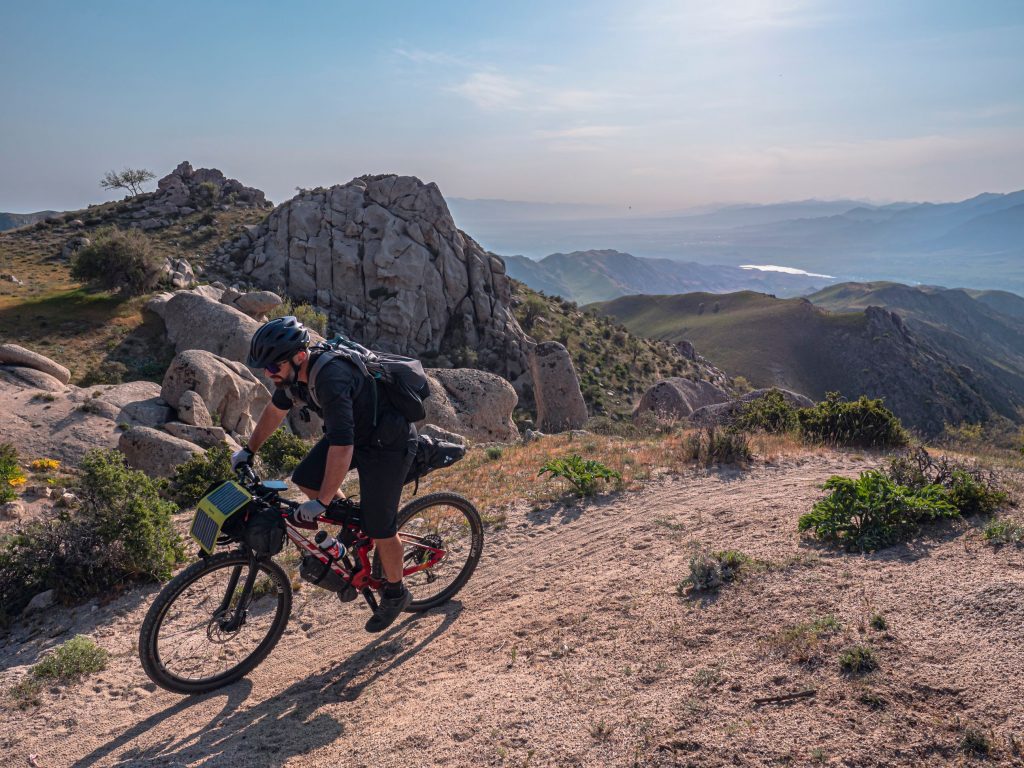
Turning back was out of the question, so I opened the gate and continued on my way. I discover a new barrier made of thorn bushes. I can't figure out how to open it, so I carefully dismantle it and reassemble it after I've gone through. The path crosses the mountainside, playing with the relief. Here's the first spring of the day! I draw my water bottle and fill up my reserves. I finish my long climb over granite slabs, a tricky passage where I nearly slip several times. On the other side, deliverance is at hand and all I have to do is descend to reach the road and a hypothetical refreshment area. But that's without counting another barrier. This time it's a heavy one! Trees have been put in the way! Impossible to imagine getting stuck. Even if it takes me hours, I'll make my way through. Finally, I find the weakness in the fortification and come down laughing at having overcome this new obstacle.
When I reach the road, it's a mad rush. I cross the road linking Samarkand to Shakhrisabz, another city with a magnificent historical heritage. At the pass, merchants sell dried fruit and cheese. I'm quickly approached by many people, including a journalist interested in my adventure. I try to find a restaurant, but there's only one stall selling a little food. I buy some bread and cheese, fill up with water and head back up the mountain. Faced with a raging wind, I drag myself along, fatigue having got the better of me and I still haven't had a proper meal... The end of the day catches up with me, and I look desperately for a sheltered spot.
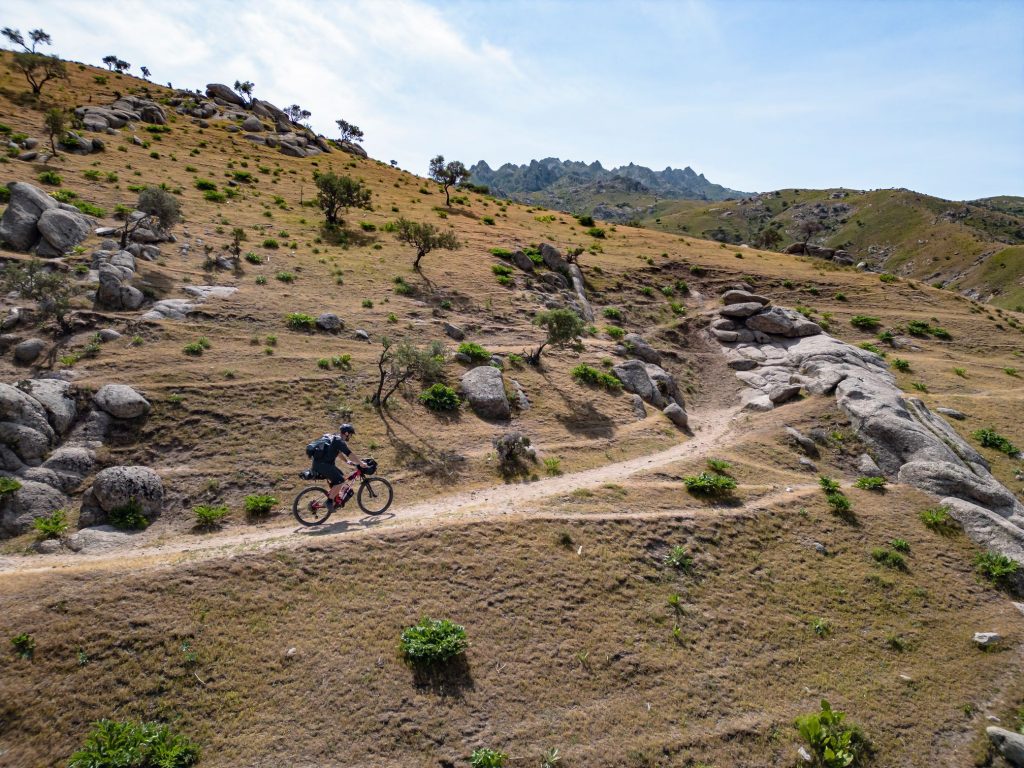
Early in the morning, I torpedo what's left of my supplies and hit the road again. The roller-coaster ride starts all over again: down a ravine, up the other side. The hour ticks by and my stomach sinks. I pass herds of cows, dreaming of roasting them on a spit... At last I begin a long descent that takes me to the edge of a village. At the first house, I meet a man with a rifle in his hand, sitting on a low wall. I ask him where I can find something to eat. His answer is crystal-clear: "At home! Mahmut invites me in. His wife brings us succulent eggs, butter, keifir (kaimok) and bread. A feast! After exchanging phone numbers and photos, I leave Mahmut and his family. I set off in the direction of the plain. The thermometer reads over 30 degrees.
After more than 80 km, it's time to look for a place to spend the night. I approach a group of young people. The owner of the local restaurant offers to take me in. He installs me in one of the alcoves. It's cool, there's a canal running under the table and I can see outside. I ask for a shower after 3 days in the same clothes, spending 11 hours on the bike. I'm given a big bucket of lukewarm water. My host then offers me 2 somsa, meat rolls. I enjoy them, then move on to my meal. I'm promised skewers, but they don't arrive. When I'm called to come and watch a goat being sacrificed, I think it's going to end up on a skewer. No, once scalped and gutted, it will be hung in front of the restaurant to attract the next day's customers! It's 11pm and the skewers haven't arrived, so I make my host understand that I'm off to bed!
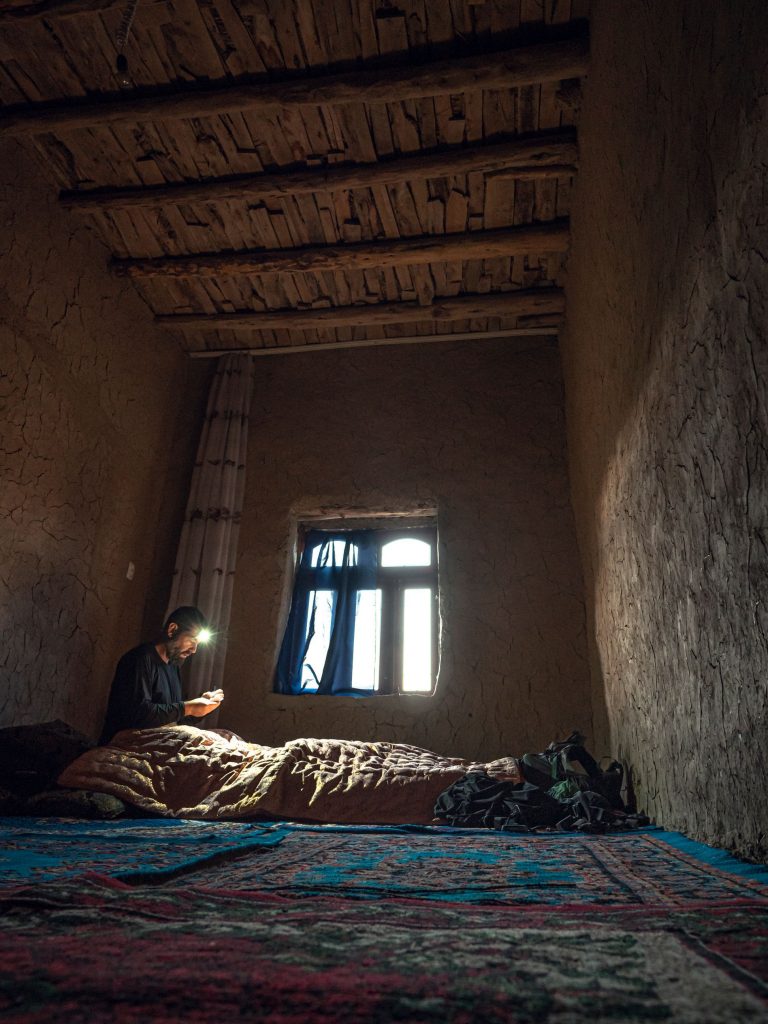
When I wake up, I decide not to hang around too long to take advantage of the cool morning air. I ask how much I owe. My host taps my phone and replies, "We don't accept money from our guests, we're Uzbeks". I set off, driving through the countryside towards the mountains. When the road stops at the bottom of this valley, I follow a path into a gorge. The torrent roars by, and I climb back up the path, which at times balances above the waves: rudimentary footbridges clinging to the cliffs ensure continuity. The path climbs steadily in an exceptional setting. Above, in a geological weakness, I can see a house! This is my final destination, but it's still a long way off. As I emerge from the canyon, the sun catches up with me. The houses are getting closer.
After crossing a slab, the path bends to the right to reach the Zarmas sloping plateau. I come across a field where some men are busy with an antediluvian tractor. I make myself known to them, who are surprised to see a tourist here. I'm invited to jump the low pebble wall and join them. I do so and find myself lying on the grass, watching the tractor plough the field for the future potato plantation. When I ask in broken Uzbek where I can sleep, Jumla, the oldest of the group, immediately offers to take me in. I can relax and contemplate the beauty of the place, and learn that no tourists have ever been up here. When we reach Jumla's house, I quickly realize that the village of Zarmas is like a forgotten village, a place where time has come to a complete standstill.
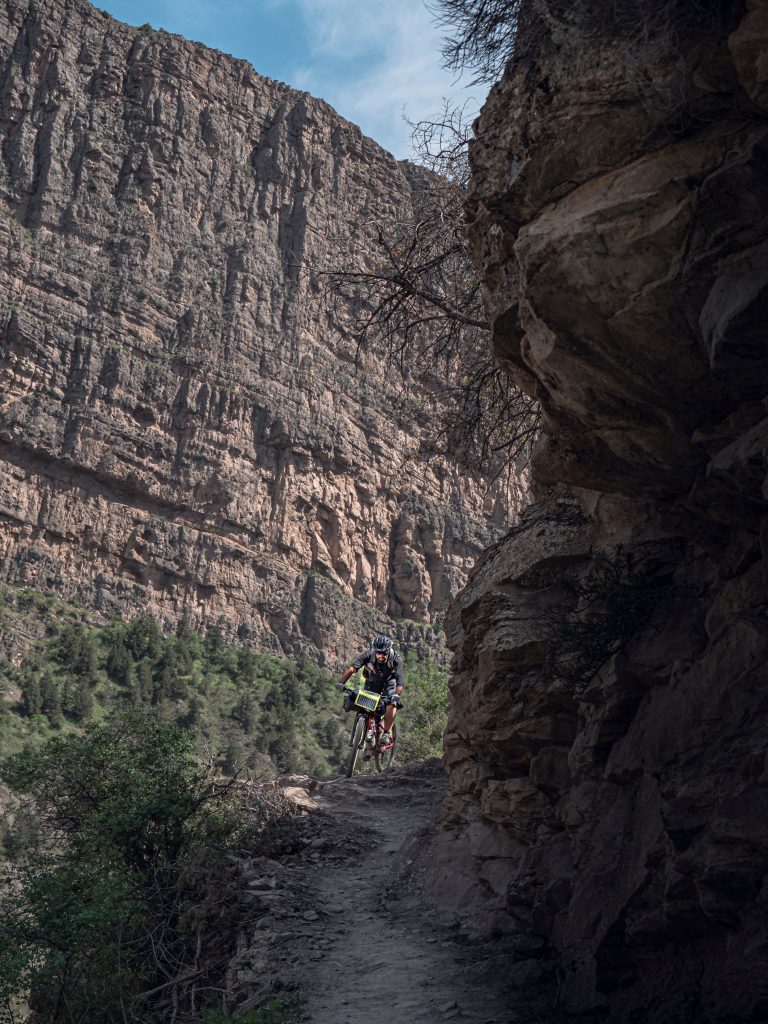
There are no roads here, just houses scattered at 2000 m altitude in a dazzling landscape. At Jumla, it's like Noah's Ark: everything is designed for self-sufficiency and for coping with the extreme rigors of winter. I enter the main room. Here, the whole family of 4 children is sheltered. We dine on potatoes, tomato coulis, meat and warm bread from the oven. We spend the evening chatting. I praise Google's technology, which enables me to translate our exchanges, however roughly. I understand that Delbah, Jumla's wife, is from Shakhrisabz and that she followed her husband here. She explains that she prefers to live here because everything in the city is expensive. But in Zarmas, they live on a shoestring and have everything at hand: water, food, they're self-sufficient. There's even a school and a doctor. I spend the night here in this forgotten part of the world.
When I wake up, they all want me to stay with them, spend another night here and plant the potatoes. It's with regret that I tell them I have to leave. I have an itinerary to keep, Shavkat has to pick me up at the end of the week in a specific place. I set off into the mountains, happy that the terrain now allows me some good pedaling. All I have for lunch is dried fruit and a piece of bread. As I approach the pass, the snow appears. I've been seeing it from afar for days. That was my original fear, coming too early and being blocked by the snow. A shepherd on his way down told me that there were some tricky sections on this side. But once on the other side, due south, the path is clear. A large snowdrift, 4 m high, stands in my way. I leave my bike and start carving steps. Once at the top, I go back down to get my gear and climb, blowing like an ox. At the top, I savor this first victory.
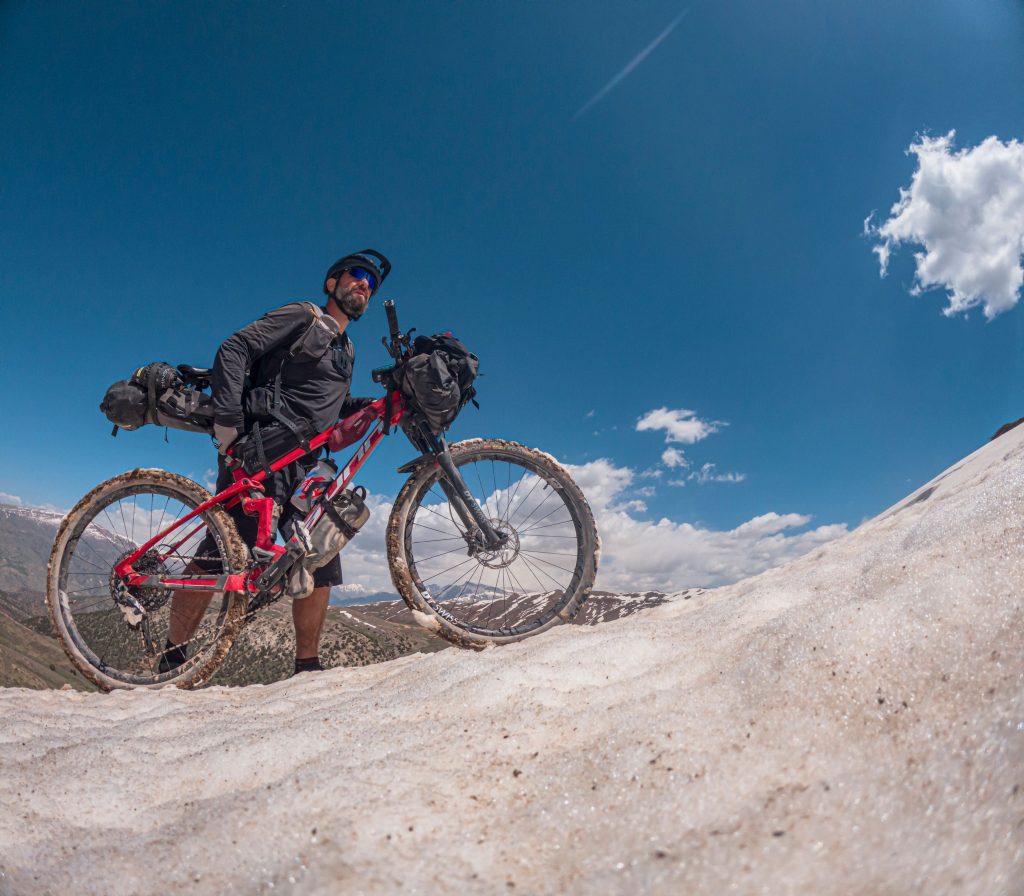
Higher up, a second névé is easily crossed. I reach the pass at 2700 m. Snowmelt streams gurgling in the pastures. On the other side, I find a pretty path which I quickly descend. The clock is ticking and I know from experience that I mustn't arrive too late at the next village if I'm to find somewhere to sleep. The trail goes on under my tires. I'm really happy to have found such beautiful paths. With less weight, it would be even better. Being alone, I have to be extra vigilant: falling is totally forbidden. Not to mention that I mustn't break anything! I'm riding a fully loaded XC bike on terrain where a good all-mountain bike would be ideal. So be careful. Further down, I come across 2 guys. Straight away, I ask them to put me up for the night. A series of palaver begins, to which I can't understand a word! Do they think I'm bilingual? One of them asks for my phone to call someone. He quickly puts me through to the caller, who doesn't speak a word of English. What can I say to him? Not much, and we end up hanging up. My 2 acolytes suggest I come down with them. I mistakenly think I'm going to sleep at one of their places. My hopes are dashed when I realize that we've just passed the house of one of the 2! We join a group of men working on the construction of a house. My case is studied in a collegial manner, then a face lights up - this will be my host for the evening. We go down to his house. The evening is peaceful but very quiet. Exchanges are limited to smiles. We have dinner with the guys from the site. I head off to bed.
Another day on the bike: I ride past many small houses where dogs regularly throw themselves at me. Now I'm used to it. I adopt the local attitude: Uzbek intonation and language, physical intimidation, the monsters run away and turn into carpets! Passing a school, I'm approached by the teaching staff. Red carpet, I'm invited for a visit. I enter the school, which consists of 2 buildings and accommodates up to 150 pupils. The principal welcomes me in Russian over tea, cakes, bread and meat. I had been short of food for the first few days, but now it's opulence!
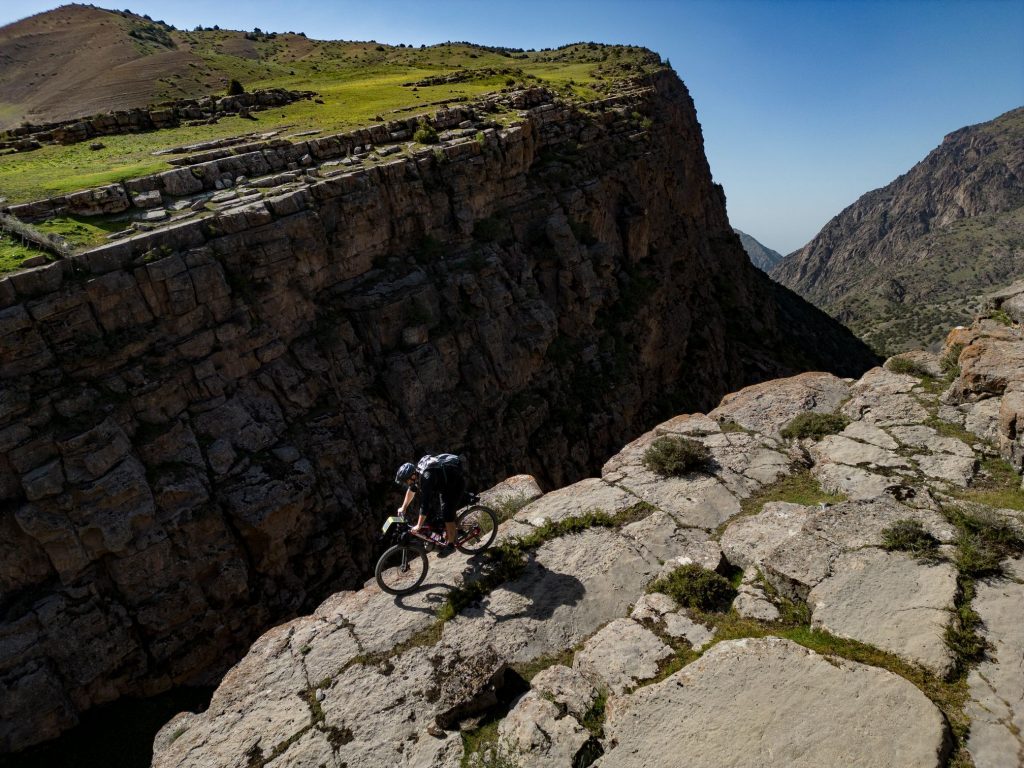
After the ritual photo session, I leave the area and continue on through these small villages. After 2 km, a door opens and a man calls out to me. Smiling, he asks me to come in. I can't refuse. We sit down in the courtyard of the house. Baxriddin introduces me to his family: his wife Saida and his son Shahruh. It's a meeting full of energy, laughter and jokes. Originally from Samarkand, this family has fled the high life to find a simpler way of life, close to nature and its abundant resources. A meaningful return to the origins of the human being. When I make the decision to leave, the family wants me to stay overnight. I'm torn, but I've only done 7 km today! With a sad heart, I set off again. I climb up through lush meadows and then scattered forests of magnificent juniper trees. Further up, I realize I'm on the wrong path. Never mind, I improvise by heading straight off-trail. It's an escape, and I make my way up to the ridge at 2500 m.
From here, a long, high-altitude traverse takes me back to the pass. I switch to the south, and a superb path through alpine meadows populated by cows leads me to a typical Uzbek traverse: how to break the legs? It doesn't get any better than this: up, down, up, down for 8 km! At the end, I continue downhill to find a B&B for the night. I pass a rider who calls out to me. It's exactly the same scene as the day before: a chat, a phone call... This time I don't waste any time and ride off. I ride quickly down to the village, where it's almost dark. 2 men in long coats and Uzbek hats are smiling broadly with gold teeth. One of the 2 agrees to welcome me. I climb up to the house, and when I cross the threshold, it's love at first sight! The most beautiful house of all welcomes me on this last evening of my adventure: incredible simplicity of construction and natural materials. The walls are made of cob. The ceiling, made of juniper planks from the local forest, gives the final touch. There's no furniture except for a small table housing an old cathode-ray TV.
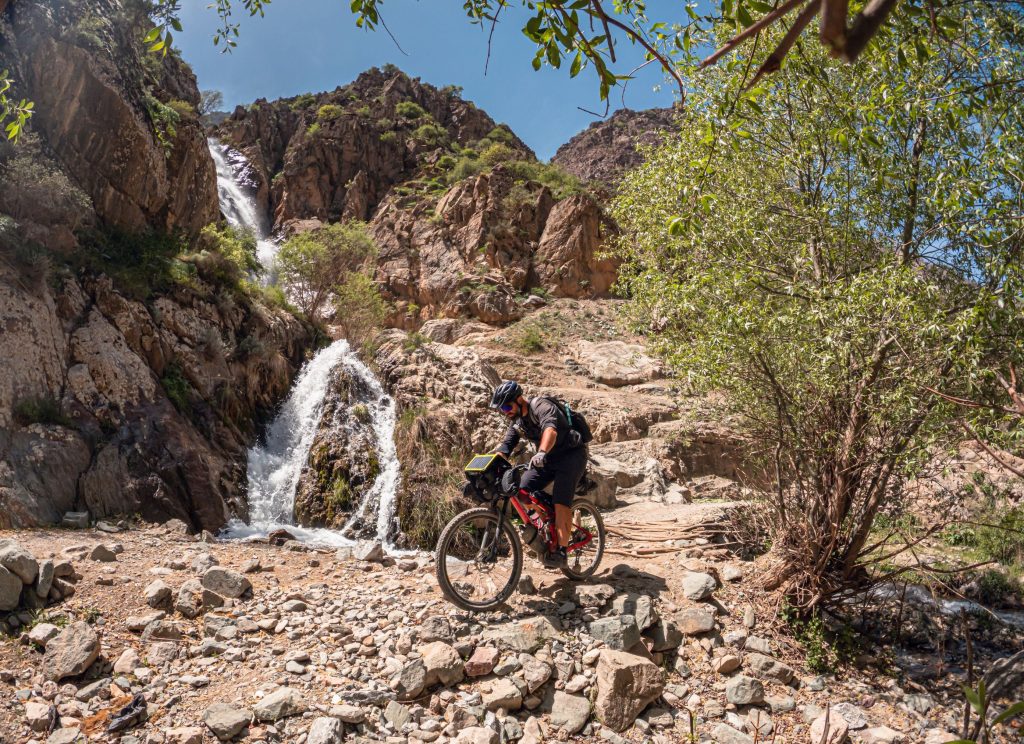
My host isn't very talkative. His wife, a little suspicious at first, becomes more and more smiling. I'm constantly watched by the couple's 5 children. They've never seen a European. I decide to host the evening and launch into a series of questions using Google Translate. It was a lively evening, with lots of laughter. We have a pleasant evening. I learn that the father is an Uzbek language teacher at the school and that some of the children want to stay here while others want to go to Samarkand. If the yawns are anything to go by, my hosts are keeping an eye on their guest. Finally, around 10pm, everyone heads off to bed. My room is absolutely comfortable, with carpets on the floor and the beauty of natural materials. I sleep until daybreak.
Some of the kids are already hard at work tending the goats, tending the garden... Bread is being prepared in the kitchen. I watch this ancestral process. The bread is kneaded in a huge timbale. The mother, assisted by her youngest daughter, passes on her know-how. Breakfast is served. Again, I'm invited to stay longer. I decline again, as I want to ride while it's not too hot. I leave this lovely family and make my way through the Uzbek countryside. Seeing the relief, I sense that this is the end of the mountains. Nothing stands in my way any more, I'm just going downhill.
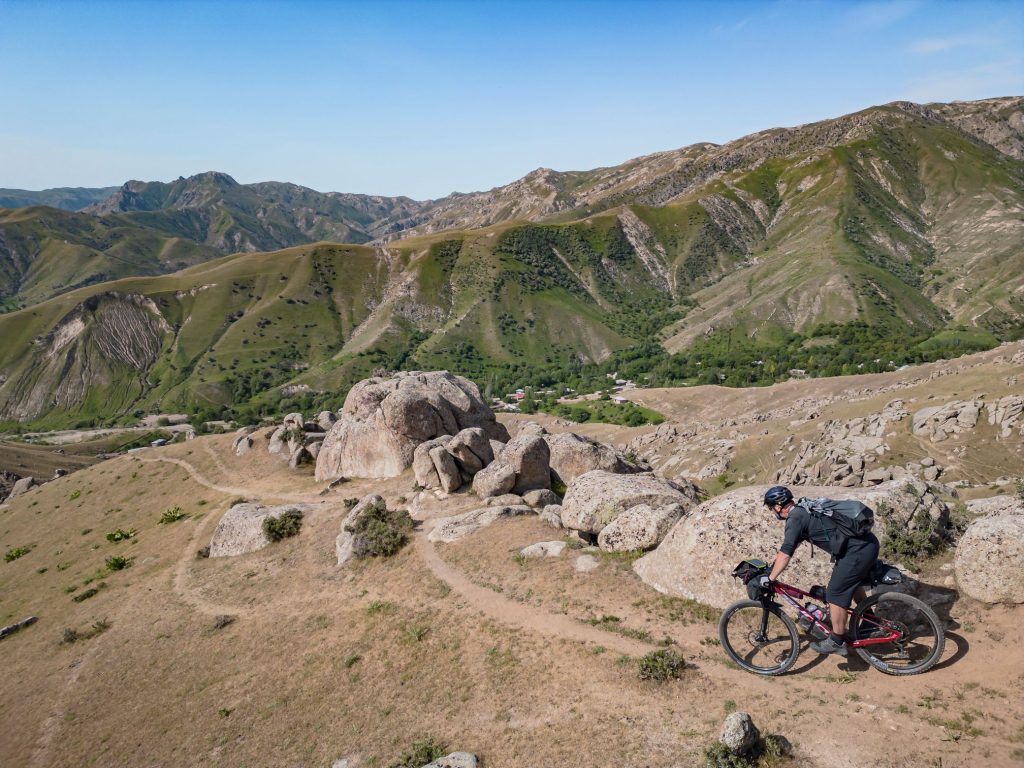
After 20 kilometers, I'm back on the tarmac. The environment is much more arid. Immediately afterwards, I enter the last region of the country I'll be visiting: after Samarkand and Kashkadaria, here I am in the Sourkhan-Daria. I make my way through a rocky gorge worthy of the Gorges du Verdon. A last welcome at the home of a couple who live by the side of the road, and then I give my last pedal strokes. I've suddenly left the soft green of the alpine pastures for dust and pebbles. The mountains are behind me as I enter the village of Darband, my final destination not far from the Afghan border. I close this Uzbek chapter, which marks my 3rd visit to a Central Asian country. I'm deeply marked by this latest adventure, both sporting and above all human. The Uzbeks seem to be ahead of most of humanity? In a world where everything moves too fast, where people are crammed into cities, often leading to even greater precariousness, here in Uzbekistan, this anchoring in nature, consuming only what is necessary, could become the salvation for a humanity in distress.
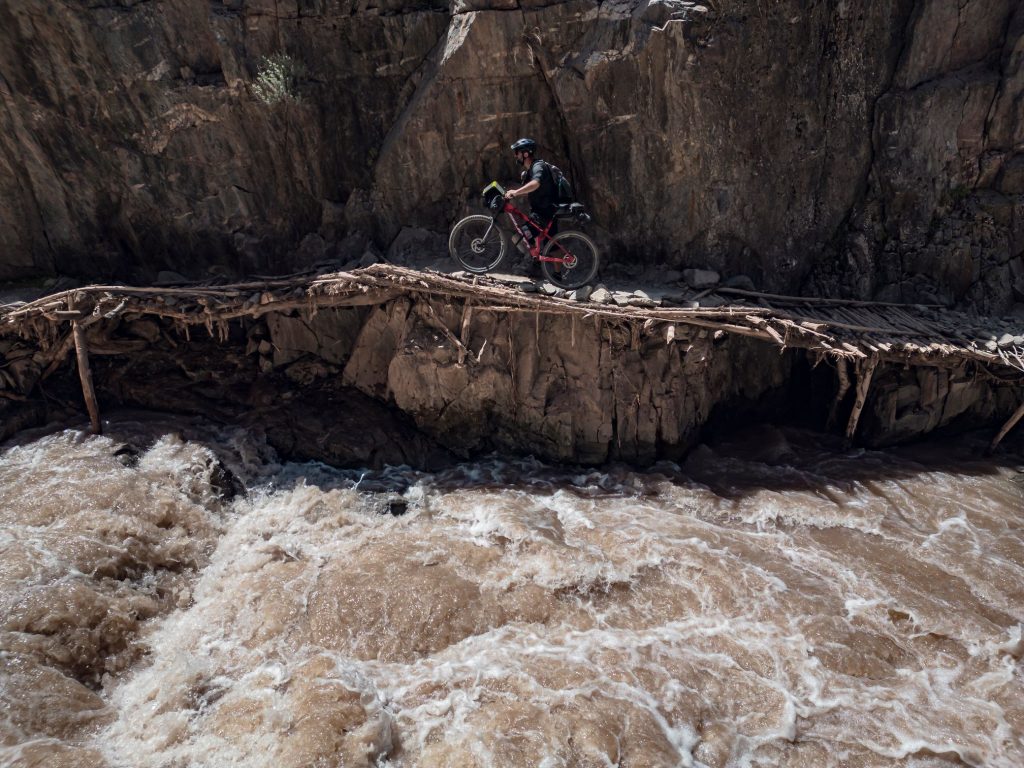
Practical info :
- How to get there Direct flights from Paris or with a stopover in the provinces. Turkish Airline generally offers the best flights. For transporting your bike, we recommend using a suitable bag.
- Time difference : + 3 hours
- Formalities no visa, passport required.
- Silver The local currency is the SUM. 125,000 = 10.25 euros. By way of information, you can eat well for 4/5 euros.
- What to see / What to do Tashkent: the mythical cities of the Silk Road: Samarkand, Bukhara, Khiva. There are many things to see in Tashkent, including one of the 4 original Korans still in existence in the world.
- Agency I can only advise you to use a local agency. For my part, I used the services of Arts et Désert, managed by Shavkat Ramazonov. Speaking perfect French, Shavkat is remarkably kind. He will go to great lengths to organize your trip. Contact him on my behalf via WhatsApp or Telegram: +998 97-282-20-82. He's also active on Instagram and Facebook.
